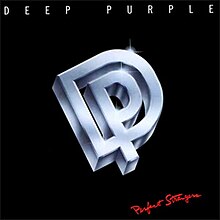
Back Perfect Strangers Bulgarian Perfect Strangers (album) Czech Perfect Strangers (Album) German Perfect Strangers (άλμπουμ) Greek Perfect Strangers (álbum) Spanish Perfect Strangers Estonian Perfect Strangers Finnish Perfect Strangers (album) French Perfect Strangers (אלבום) HE Perfect Strangers (album) Croatian
| Perfect Strangers | ||||
|---|---|---|---|---|
 | ||||
| Studio album by | ||||
| Released | 29 October 1984 | |||
| Recorded | 10 July – 26 August 1984[1] | |||
| Studio | "Horizons" in Stowe, Vermont, USA with Le Mobile Studio | |||
| Genre | ||||
| Length | 40:02 | |||
| Label | Polydor | |||
| Producer | Roger Glover, Deep Purple | |||
| Deep Purple chronology | ||||
| ||||
| Singles from Perfect Strangers | ||||
| ||||
Perfect Strangers is the eleventh studio album by English rock band Deep Purple, released on 29 October 1984. It was the most successful album recorded by the re-formed 'Mark II' line-up.[4]
It was the first Deep Purple studio album in nine years. Perfect Strangers is also the first album with the Mk II line-up in eleven years, the last being Who Do We Think We Are (1973). Its nine-year gap from Come Taste the Band (1975) marks the longest between two studio albums from the band to date. Ritchie Blackmore and Roger Glover arrived from Rainbow, Ian Gillan from Black Sabbath, Jon Lord from Whitesnake, and Ian Paice from Gary Moore's backing band. Just one song in the reformed Deep Purple’s new repertoire, "Nobody’s Home", would be credited to all five band members. Gillan and Glover attempted to return matters to the all-for-one composition credits of the Mk II lineup's 1970–73 recordings, but Blackmore held firm. It was not until Blackmore permanently left the group in 1993 that the issue was finally resolved.[5]
The CD and cassette versions of the album contained the extra track "Not Responsible" (which contains the lyric "I've got no ticket, but I'm gonna take a fucking ride", making it one of the few Deep Purple tracks to feature profanity). The album was remastered and reissued on 22 June 1999 with the bonus instrumental track "Son of Alerik". The latter had previously been available as a B-side on the single "Perfect Strangers" in 1984.
The album was a commercial success, reaching #5 in the UK charts and #17 on the Billboard 200 in the US. Perfect Strangers was only the third Deep Purple studio album to be certified platinum in the United States, following Machine Head (1972) & Burn.[6] The tour was so successful that the band had to book many additional dates to the U.S. arena tour, as tickets sold out very quickly. Their U.S. tour in 1985 out-grossed every artist that year except Bruce Springsteen.[7]
- ^ Gillan, Ian (2016). The Autobiography (3rd ed.). John Blake Publishing. p. 327. ISBN 978-1-786-06135-5.
- ^ "Deep Purple singles".
- ^ "Deep Purple singles".
- ^ Adams, Bret. "Deep Purple - Perfect Strangers review". AllMusic. All Media Network. Retrieved 5 February 2017.
- ^ Dave Thompson Smoke on the Water: The Deep Purple Story. 2004. pp. 241
- ^ "Deep Purple & A Momentous Mark II Reunion". udiscovermusic.com. Retrieved 5 November 2014.
- ^ Lalaina, Joe (January 1989). "Jon Lord's Purple Reign". Modern Keyboard. Retrieved 5 February 2017.